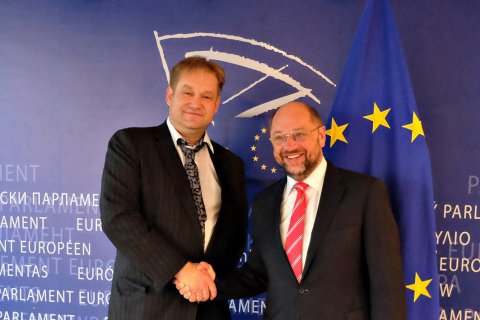



EU Unity Pivotal During Russian Ban
ESTONIA - Estonia’s Agriculture Minister Ivar Padar met on the morning of 4 September in Brussels with European Parliament President Martin Schulz with whom he discussed the possible affects of Russia sanctions on the food industry. They concluded that keeping the unity of the European Union was of most importance.
Russian Prime Minister Dmitry Medvedev announced on 7 August that Moscow was imposing a complete embargo on beef and pork, fruits and vegetables, poultry, fish, cheese, milk and milk products in the European Union, the USA, Australia, Canada and Norway.
Martin Schulz said at the meeting that he understood the situation in Estonia and the Baltic states.
"The European Union is united behind our food industry and is looking for solutions to alleviate the effects of the political crisis to the farmers. It is very important that solutions are uniform throughout the EU," said Mr Schulz.
Minister Padar said that the Russian food import ban has hit producers of milk and pork and the fisheries industry the hardest, though the state has limited options at this time for supporting them.
The minister said that the European Commission has recently made a decision to support dairy producers. Pig farmers will start getting extra subsidies at the end of the year, as the aid measure has already been set on the state level.
“In December, we will start paying special grants to pig farmers,” said Mr Padar, noting that the amount involved will be approximately €2.6 million, to be specified in November. The ministry has calculated that the grants can be paid for approximately 320,000 pigs.
Not Russia-Dependent
Minister Padar said that crises will be an opportunity to organise things in a new and better way. He added that in the short term, although the sanctions have a significant impact on farm businesses probably, in the long run you will have a clear perspective of agriculture in Estonia.
Estonian agriculture in the last decade become strong enough to survive the Russian sanctions resulting from setbacks.
"20 years ago, our farm had to adapt to the market economy 10 years ago, the European common market. Currently, our challenge is to adapt to change and reach new markets, "said Minister Padar.
"To this end, we need to act more effectively in the production of food and raw materials valorise anymore." he said.
Farmers Unite
Members of agriculture groups from the three Baltic States gathered in Riga in late August to discuss the present situation in the agricultural sector, which is affected by both Russia’s embargo and African swine fever.
As farmers incur heavy losses due to sanctions and African swine fever, it was proposed to declare Lithuania, Latvia and Estonia as an EU buffer zone and establish a specialised fund to compensate for losses.
The Chamber of Agriculture of Lithuania, together with other groups, is drafting the position of the Baltic States regarding buffer zone status. The position will be presented to the governments of the Baltic countries and sent as an open letter to the European commissioner for agriculture and rural development.
According to Eurostat, because of Russia’s embargo Lithuania’s losses are right now the highest of the Baltic States at an estimated €927 million, while Estonia’s and Latvia’s are 75 million euros and 70 million euros, respectively. Lithuanian trade is more heavily targeted to Russia than the other Baltic States.
Aggregate losses of EU member countries are estimated at €5.2 billion.








